BusinessEurope Headlines No. 2017-43
New partnership aims to facilitate labour market integration of refugees
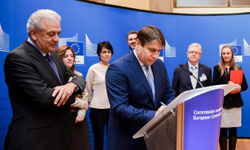 “Many refugees have been granted the right to stay in Europe in the last years. They should be supported in their efforts to be active on labour markets as quickly as possible. Obtaining results is the best way for Europe and its Member States to deliver on our social values. Pragmatism should prevail when adapting legal frameworks to encourage employers to hire refugees”, said BusinessEurope Director General Markus J. Beyrer during the launch of a new partnership for the labour market integration of refugees on 20 December 2017. The partnership is built around a multi-stakeholder approach involving the European Commission and the European social and economic partners - BusinessEurope, the European Centre of Employers and Enterprises providing Public Services and Services of general interest (CEEP), the European Association of Craft, Small and Medium-sized Enterprises (UEAPME), the European Trade Union Confederation (ETUC) and Eurochambres. It aims to facilitate labour market integration through awareness raising and sharing of information on national and local initiatives.
“Many refugees have been granted the right to stay in Europe in the last years. They should be supported in their efforts to be active on labour markets as quickly as possible. Obtaining results is the best way for Europe and its Member States to deliver on our social values. Pragmatism should prevail when adapting legal frameworks to encourage employers to hire refugees”, said BusinessEurope Director General Markus J. Beyrer during the launch of a new partnership for the labour market integration of refugees on 20 December 2017. The partnership is built around a multi-stakeholder approach involving the European Commission and the European social and economic partners - BusinessEurope, the European Centre of Employers and Enterprises providing Public Services and Services of general interest (CEEP), the European Association of Craft, Small and Medium-sized Enterprises (UEAPME), the European Trade Union Confederation (ETUC) and Eurochambres. It aims to facilitate labour market integration through awareness raising and sharing of information on national and local initiatives.
Photo copyright: European Union, 2017
![]() Contact: Maxime Cerutti
Contact: Maxime Cerutti
Lessons learnt from the crisis
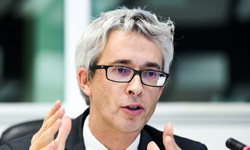 “Member States that entered the economic crisis with strong and supportive business environments generally experienced a shorter and shallow recession”, said BusinessEurope Economics Director James Watson at a European Economic and Social Committee (EESC) hearing on lessons learned for avoiding the severity of austerity policies in the EU, on 13 December 2017. He also emphasised the importance that Members States use the current opportunity afforded by relatively strong EU growth to strengthen their public finances to ensure they have more flexibility to allow economic stabilisers to operate fully during the next downturn. Drawing on BusinessEurope’s annual Reform Barometer, James concluded that whilst many Member States have made progress in reducing annual government borrowing, average Government debt remains around 90% across the Euro Areas as a whole.
“Member States that entered the economic crisis with strong and supportive business environments generally experienced a shorter and shallow recession”, said BusinessEurope Economics Director James Watson at a European Economic and Social Committee (EESC) hearing on lessons learned for avoiding the severity of austerity policies in the EU, on 13 December 2017. He also emphasised the importance that Members States use the current opportunity afforded by relatively strong EU growth to strengthen their public finances to ensure they have more flexibility to allow economic stabilisers to operate fully during the next downturn. Drawing on BusinessEurope’s annual Reform Barometer, James concluded that whilst many Member States have made progress in reducing annual government borrowing, average Government debt remains around 90% across the Euro Areas as a whole.
![]() Contact: James Watson
Contact: James Watson
European business calls for a modern and competitive EU regime on export controls
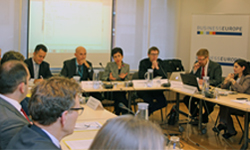 BusinessEurope and the European Safeguards Research and Development Association (ESARDA) jointly organised a workshop on export controls on dual-use items on 20 December 2017 in Brussels. Gathering high-level representatives of companies, the EU institutions, the EU Member States’ competent authorities and their counterparts from South Korea and Japan, the event focused on the on-going modernisation of the EU’s Export Controls Regime, especially regarding cybersecurity. Participants also had the opportunity to share their experiences and best practices on the implementation of Internal Compliance Programmes (ICP) and their cooperation with national authorities. They agreed that the modernisation of the EU regime on export controls should take into account the current challenges in the field of dual-use, keeping the right balance between security and trade policy objectives.
BusinessEurope and the European Safeguards Research and Development Association (ESARDA) jointly organised a workshop on export controls on dual-use items on 20 December 2017 in Brussels. Gathering high-level representatives of companies, the EU institutions, the EU Member States’ competent authorities and their counterparts from South Korea and Japan, the event focused on the on-going modernisation of the EU’s Export Controls Regime, especially regarding cybersecurity. Participants also had the opportunity to share their experiences and best practices on the implementation of Internal Compliance Programmes (ICP) and their cooperation with national authorities. They agreed that the modernisation of the EU regime on export controls should take into account the current challenges in the field of dual-use, keeping the right balance between security and trade policy objectives.
Contact: Sofia Bournou
The European Circular Economy Industry Platform already published 100 examples. For more info, please visit www.circulary.eu
WTO Ministerial Conference delivers minimal outcome
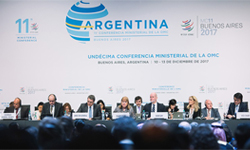 The result of the 11th Ministerial Conference of the World Trade Organisation (WTO), which took place from 10 to 13 December 2017 in Buenos Aires, was particularly limited. It comprised three areas: a work programme on e-commerce and the renewal of the moratorium on duties on electronic transmissions; the extension of the Trade-Related Aspects of Intellectual Property Rights (TRIPs) non-violation moratorium; and the continuation of negotiations on an agreement on the issue of fisheries subsidies. Members were not able to agree on a common Ministerial Declaration, which is a usual practice, showing a clear indication that there are deep divisions amongst them on issues related to the negotiating function of the WTO – for instance which topics should be discussed - and how its dispute settlement function should be reformed and safeguarded. BusinessEurope will follow closely developments during the post-Buenos Aires period and contribute with concrete recommendations on how to ensure the central role of the WTO in global trade.
The result of the 11th Ministerial Conference of the World Trade Organisation (WTO), which took place from 10 to 13 December 2017 in Buenos Aires, was particularly limited. It comprised three areas: a work programme on e-commerce and the renewal of the moratorium on duties on electronic transmissions; the extension of the Trade-Related Aspects of Intellectual Property Rights (TRIPs) non-violation moratorium; and the continuation of negotiations on an agreement on the issue of fisheries subsidies. Members were not able to agree on a common Ministerial Declaration, which is a usual practice, showing a clear indication that there are deep divisions amongst them on issues related to the negotiating function of the WTO – for instance which topics should be discussed - and how its dispute settlement function should be reformed and safeguarded. BusinessEurope will follow closely developments during the post-Buenos Aires period and contribute with concrete recommendations on how to ensure the central role of the WTO in global trade.
Photo copyright: WTO
Contact: Sofia Bournou
Europe needs a coherent AI strategy
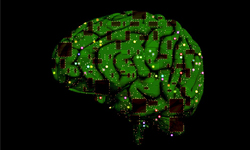 Artificial Intelligence (AI) technologies have the potential to double Europe’s growth rates and improve living conditions for society through delivering more efficient healthcare, agriculture, education, infrastructure and public safety. Yet Europe needs to develop a coherent European strategy for the application of these innovative technologies in order to foster these benefits and continue our scientific and commercial leadership. That is why BusinessEurope has recently released a strategy paper on the topic that sets out our key messages on some challenges that AI should overcome in order to be successfully fostered. With this contribution BusinessEurope aims to responsibly engage on these topics in real time with policy makers. It should also map out key positions in advance of the European Commission’s preparation for its 3rd data package in April 2018. We look forward to beginning this engagement.
Artificial Intelligence (AI) technologies have the potential to double Europe’s growth rates and improve living conditions for society through delivering more efficient healthcare, agriculture, education, infrastructure and public safety. Yet Europe needs to develop a coherent European strategy for the application of these innovative technologies in order to foster these benefits and continue our scientific and commercial leadership. That is why BusinessEurope has recently released a strategy paper on the topic that sets out our key messages on some challenges that AI should overcome in order to be successfully fostered. With this contribution BusinessEurope aims to responsibly engage on these topics in real time with policy makers. It should also map out key positions in advance of the European Commission’s preparation for its 3rd data package in April 2018. We look forward to beginning this engagement.
![]() Contact: Patrick Grant
Contact: Patrick Grant
Season's greetings
 BusinessEurope wishes you a merry Christmas, a festive holiday season and all the best for 2018! The Headlines will be back on 11 January.
BusinessEurope wishes you a merry Christmas, a festive holiday season and all the best for 2018! The Headlines will be back on 11 January.
Calendar 
- 1 January: Bulgarian Presidency of the Council of the EU
- 10 January: European Commission proposals on the Digital Single Market
- 13 January: New Eurogroup President Mário Centeno takes office
- 16 January: Fair taxation package 3
- 16 January: Company law package
- 16 January: Circular economy package
